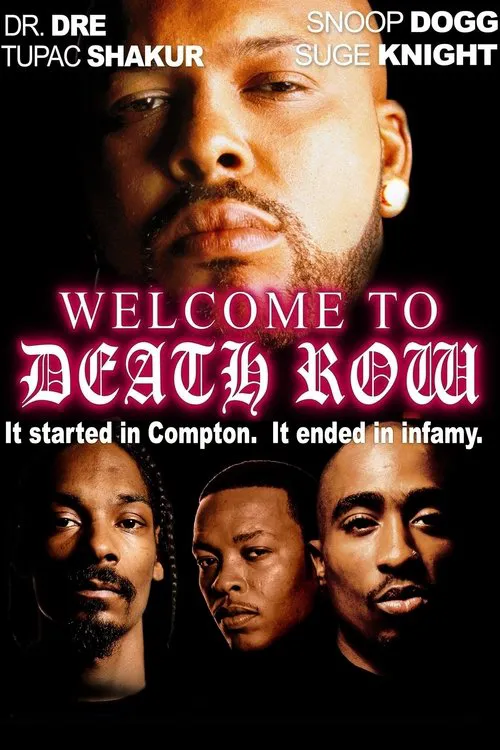Welcome to Death Row

Plot
In the 1990s, hip-hop music underwent a transformative period, marked by the emergence of new artists, innovative production techniques, and a wave of West Coast rap that dominated the industry. At the center of this explosion was Death Row Records, a label founded by ex-bodyguard Suge Knight and Marion "Suge" Knight's business partner Dr. Dre. This fascinating documentary, "Welcome to Death Row", takes viewers on a journey through the turbulent history of this groundbreaking record label, which played a pivotal role in shaping the sound of American hip-hop. The film begins by exploring the early days of Death Row Records, highlighting Suge Knight's journey from being a security guard to becoming a key figure in the hip-hop industry. Born in 1965, Marion "Suge" Knight was raised in the rough streets of Los Angeles, where he quickly learned the importance of self-defense and the harsh realities of urban life. His entry into the music industry began when he worked as a bodyguard for various celebrities, including the famous rapper Ice Cube. As his reputation grew, Knight befriended Dr. Dre, who was then a rising star in the rap world. This fortuitous friendship led to the inception of Death Row Records in 1991. Initially, Knight and Dre had ambitious plans to establish a record label that would promote African American artists and challenge the dominance of traditional record labels. Their vision was to create a platform where artists could express themselves freely and create uncompromising music that reflected the reality of urban life. With Suge Knight at the helm, Death Row Records quickly gained momentum, attracting talented musicians and securing deals with major record labels. The label's early success can be attributed to the collaboration between Dr. Dre and Snoop Doggy Dogg, two artists who would become synonymous with West Coast rap. Dre's The Chronic, released in 1992, is widely regarded as one of the seminal rap albums of all time, its G-Funk sound revolutionizing the genre and paving the way for Death Row Records' ascent. Snoop Dogg's debut album, also released in 1992, cemented the label's status as a major player in the hip-hop industry. One of the most pivotal moments in the history of Death Row Records was the signing of Tupac Shakur, the charismatic rapper from East Harlem who would become a martyr for the hip-hop movement. Tupac's powerful lyrics and impassioned delivery resonated with fans worldwide, and his music quickly became the label's driving force. The East Coast-West Coast rivalry, fueled by the feud between Tupac and The Notorious B.I.G. of Bad Boy Records, brought immense attention to Death Row Records, with both artists releasing provocative and critically acclaimed albums. "Welcome to Death Row" sheds light on the tumultuous relationships between Death Row Records' most prominent artists, including the complicated friendship between Tupac and Suge Knight. Despite the label's phenomenal success, internal conflicts and external pressures took a toll on the artists, resulting in a decline of the label's fortunes. As the film documents, the company's struggles were exacerbated by Suge Knight's authoritarian management style, leading to creative differences and tensions between artists. In recent years, Death Row Records has experienced a revival, thanks in part to the rise of streaming platforms and a renewed interest in the label's influential music. "Welcome to Death Row" concludes by highlighting the lasting impact of the label's legacy, its artists, and their contribution to the hip-hop movement. The documentary serves as a testament to the power of music to transcend boundaries, challenge the status quo, and bring people together in a shared culture of artistic expression. Through its gripping narrative, "Welcome to Death Row" reminds us that the story of Death Row Records is not merely a tale of success and failure but a window into the human experience of artists, entrepreneurs, and industry executives navigating the treacherous landscape of the entertainment industry. With its rich archival footage and candid interviews, the documentary serves as a fascinating and informative tribute to the enduring legacy of one of the most iconic record labels in music history.
Reviews
Recommendations




